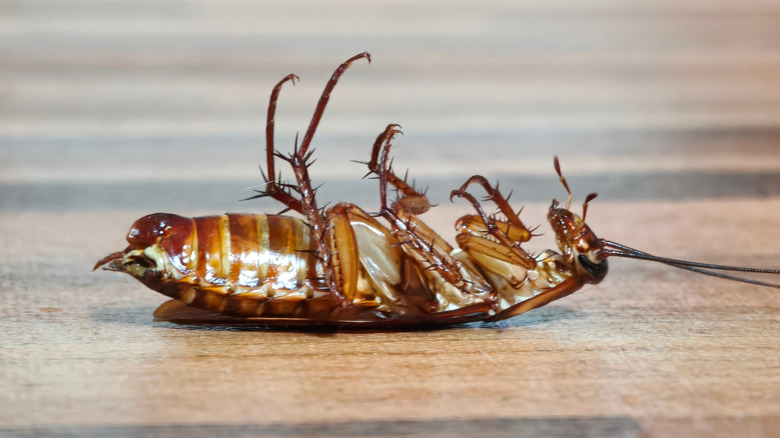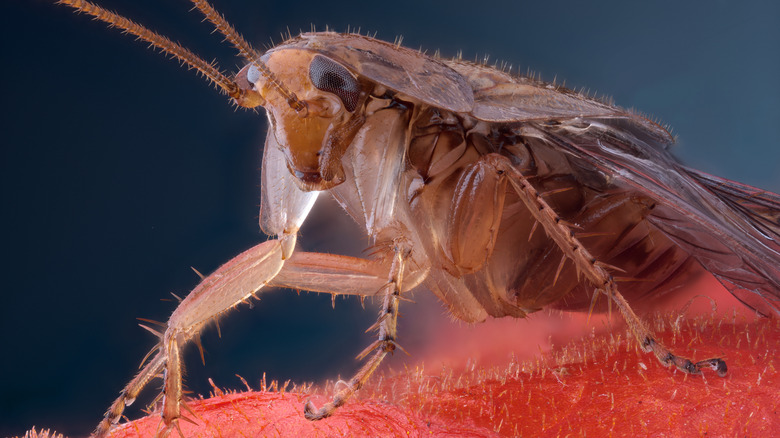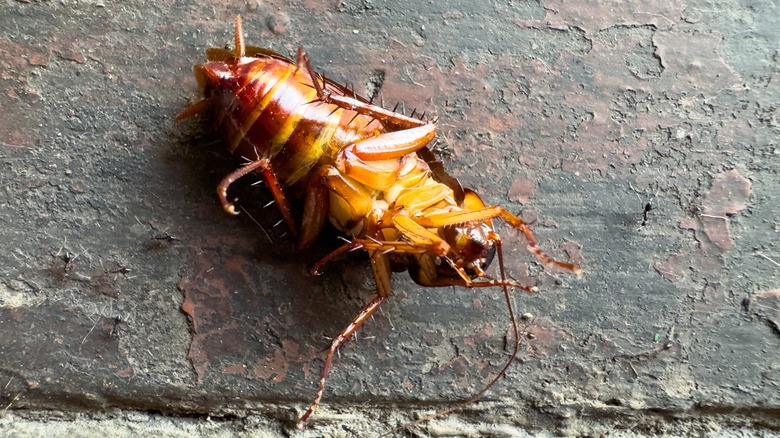The Unsettling Reason You Should Never Squash A Cockroach In Your Home
We may receive a commission on purchases made from links.
Cockroaches might not be nature's most indestructible organism, but they're generally known to be pretty hardy insects. Most of us have probably heard that cockroaches are able to survive a nuclear detonation, which as it happens, is just a myth. These invertebrates would absolutely perish in the wake of a nuclear explosion and shockwave, but the prevalence of this myth speaks to just how resilient these creatures actually are.
There are roughly 3,500 species of cockroach, with 55 species found in the United States. The most common is the German cockroach, but the American cockroach has an infamous global reputation for being resilient. Known as "Xiao Qiang" in China, which translates as "little mighty", the American cockroach prompted a 2018 study published in Nature which tried to looked at the genetic basis for its resilience. The team found genes that coded for hundreds of scent and taste receptors, making the creatures excellent scavengers, and also found that the species was closely related to termites, another extremely hard-to-kill pest. The animal, which, based on fossil evidence, is thought to have been on Earth for more than 300 million years, also has genes that make it capable of regrowing limbs and even producing its own antibiotics. So, while it might not be able to withstand a nuclear detonation, it's still one of the most stubbornly tough pests in existence.
As such, our instinct when confronted with a cockroach is to smash it into oblivion, thereby ensuring the notoriously hardy pest is gone for good. But it turns out squashing these creatures is a bad idea, mainly because they carry a host of nasty bacteria, viruses, and other microorganisms that can contaminate surfaces and potentially infect us humans.
Squashing a cockroach is a good way to spread disease
Though cockroaches can be found outside in moist, warm areas (which is why roaches often die in the winter), they actually prefer indoor environments where they have better access to food, water, shelter, and warmth. That means if we do come across these insects, we're more likely to do so in our homes than anywhere else, which can be a truly upsetting experience for anyone who knows even a little about these hardy scavengers.
It's not just that cockroaches don't look all that appealing. Most of us will know that they're not all that cleanly, and seeing one in our home not only can be startling but it sort of subtly implies that we're living in some sort of unsanitary dump. The impulse to smash the creatures can therefore be overwhelming, but as you might expect, sending cockroach parts flying across your floors or surfaces isn't the best idea given their uncleanliness.
Cockroaches can transfer disease-spreading organisms including bacteria, viruses, and unicellular parasites like protozoa which can cause problems for us humans. Not only do these nasty organisms exacerbate allergic reactions and asthma in individuals that suffer from such things, the unsavory organisms on cockroaches can easily infect us. Bacteria such as E. coli and salmonella, for example, are more easily spread when we smash cockroaches, and can be spread even further after contaminating surfaces if we track the bacteria on our shoes.
How are you supposed to kill roaches?
When we squash cockroaches, it's not just the viruses and bacteria held within that particular creature that we have to worry about. Crushing one of these grimy insects also causes them to produce chemical signals, including pheromones, which attract other nearby cockroaches. When those other roaches arrive, they can bring with them all the horrible microorganisms that the original had. As a 2024 study published in Scientific Reports noted, studies have determined that roaches can carry around 50 species of pathogenic bacteria including campylobacter, salmonella, E. coli, and even norovirus. The researchers in that particular study also noted that simply having cockroaches in food-related environments can "pose a significant threat to public health," so imagine if you start squishing them and sending those bacteria across your floors and surfaces?
There's also the issue of cockroach odor. When roaches are squashed, their bodily fluids can leak, and as you might expect given all we know about these grubby little pests, those fluids often don't smell all that good.
Clearly, then, squashing cockroaches isn't the way to go. But there are other ways to control a cockroach infestation. Gel baits are not only small and easy to hide, but they can cause roaches to carry poison back to nests and take out more of the insects. Similarly, sticky traps can catch the insects in a way that doesn't allow the roach to send out any signals. Otherwise sealing up cracks in your home and keeping things clean are great ways to make sure you're not suddenly overrun by the "little mighty ones."


